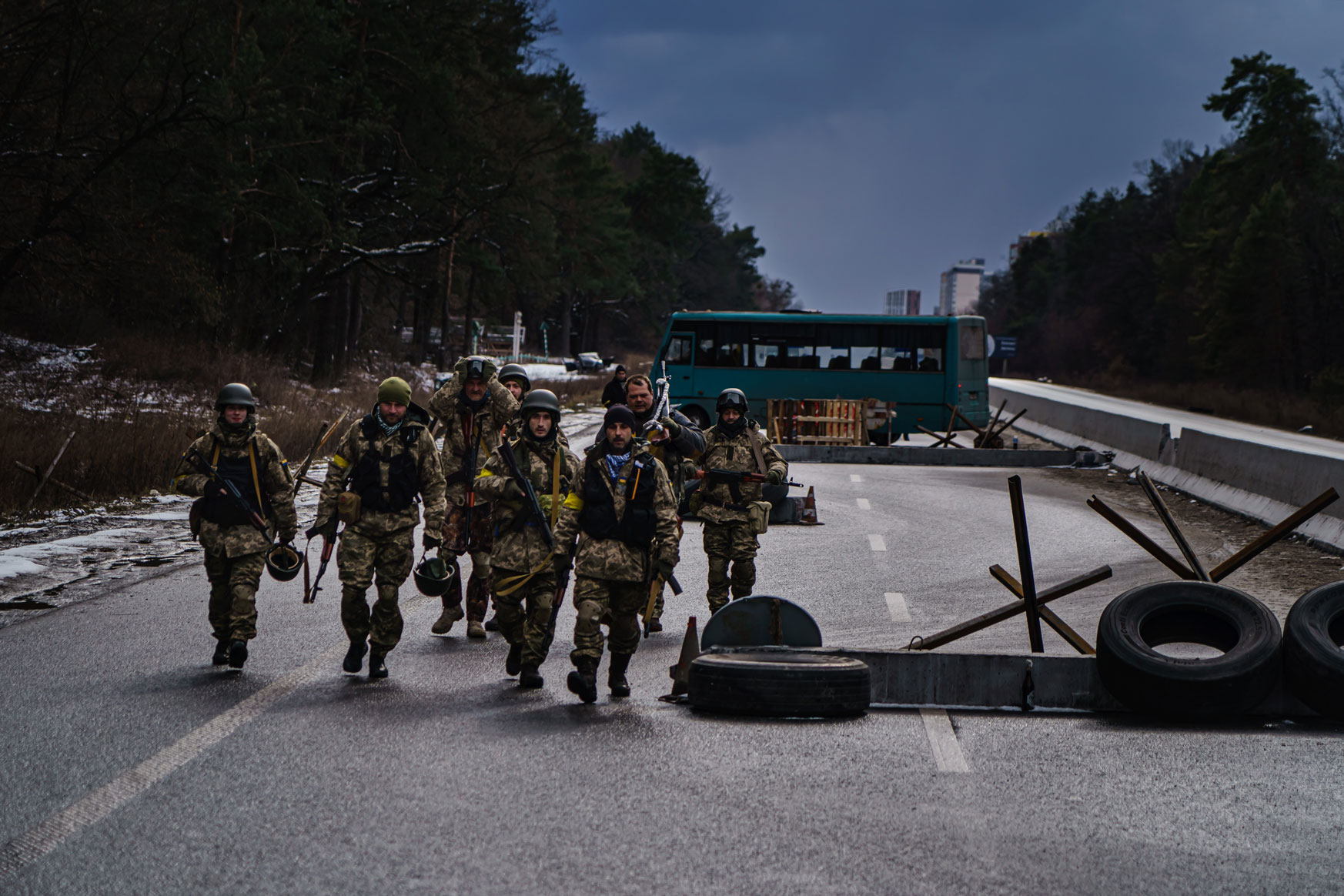Going in the opposite direction is a traffic jam of humanity, cars sluggish in the unexpected, prickly March heat. The mood in Vlad’s dodgy red Skoda is bleak as we speed out of Kyiv, sashaying around the tank traps fashioned from railway tracks, heading toward Brovary, the town where the Russian invasion of Kyiv from the east was stopped dead in its tracks in the second week of the war.
We drive past the shrine for the Ukrainians murdered in Stalin’s Great Terror, past a checkpoint littered with “Bandera Smoothies” (the local nickname for Molotov cocktails) ready to be thrown at the invaders, past vehicles smashed into the gray cement barrier, through Brovary, where people’s faces are painted with fear, toward the Russian army.
You can tell the war is close because ordinary life disappears. There’s no one walking their dog, no old people shuffling, no kids. We sail through the checkpoint we were stopped at last time we were here and zoom along an empty highway, through Kalynivka and into unknown territory.
Just beyond the next checkpoint in the village of Skybyn, where the battle of Brovary took place, the charred hulls of Russian tanks still sit. There is a big dog running wild, stacks of wood behind concrete slabs, soldiers purposeful. Artillery crumps — not close, not too far away. The boss of the checkpoint looks at our passports and tells us to go back.
We do so.
At the first gas station back in Kalynivka, we take stock, drink a cappuccino and listen to outgoing artillery fire, which feels gentler than incoming artillery. The gas station is full of good Italian red wine, but it’s not for sale because the authorities have banned alcohol transactions.
Behind us in the line is Julia Grabova, who speaks English with a British accent and lives one village away from where the Russian army is now positioned. A lot of people are afraid to talk to foreign media these days — paranoia about Russian spies runs deep — but Julia is willing. She understands that we’re here to report on Russian President Vladimir Putin’s cruel war.
“The Russian are going backwards?” I ask, holding my camera phone up to record her.
“Yes.”
“How noisy is it?”
“It depends. Monday was very noisy, yesterday more quiet.”
“When was the last time you felt the ground shake?”
“Yesterday. It was very bad.”
“What do you do normally?”
“I work in HR. I am still working, remotely.”
“So you’re working in HR while feeling incoming Russian artillery. You’re the bravest HR person I’ve met.”
This being Ukraine, we both start laughing.
“What do you make of Putin?” I continue with my questions.
“It is mad,” Julia says. “It is strange that the war happened. Until the first day of the war, we could not believe it would happen.”
“There are reports that the Russian soldiers are starving. Have you heard that?”
“Yes …”
Then the person selling gas tells us to stop recording. More paranoia.
I get Julia’s number, and she fills me in on the details later. “Sometimes I can feel the artillery when the house vibrates.”
Julia has family, friends and colleagues in the Russian-occupied villages north and east of Brovary. “The Russian tanks came on March 8. The mother of my ex-husband said that there were three on her street in Bohdanivka,” she says, referring to a village 3 miles back from Skybyn and just off the main drag. “A work colleague said they moved into his house in Bohdanivka. They checked his phone to see if he had any incriminating photos, and he hadn’t. They moved in and cooked all their food, but he said that they were not aggressive.”
On March 21, many of the villagers were able to leave. Now, Julia says, the Russians are surrounded by the Ukrainian army. I start to think about these Russian kids telling “zombie lies” — the phrase comes from the chief rabbi of Kyiv’s Brodsky Synagogue, Moshe Azman — sitting in their metal boxes, waiting to die.
The Ukrainians have put up a drone video armed with thermal imaging. It’s so chilly out there that the Russian tank crews sit with their engines running through the night. As the Ukrainian drone hovers over the woods in the blackness, it picks out the Russian tanks hiding in the cold. Each Russian exhaust spills its presence, white on black. Then Ukrainian artillery, pinpointed by the drone, moves in for the kill and takes out each white dot, one by one.
For the Russian soldiers, there are times when it must feel like they are being broken by warriors from the future, ghost spirits that can take them out while they hide in the thickest of forests. They are fighting time itself.
We leave for Kyiv at 1 p.m., and the journey back is grim. This time we are traveling with refugees, and our plodding progress is slowed further when the Ukrainian police stop us to check my British passport against the national database. The police officer, sporting a balaclava and automatic rifle, returns it, saying: “Have a nice day!”
In Kyiv, they have closed one of the bridges across the Dnieper River, so Vlad, who lives on the east bank, leaves us and we walk across the bridge in the dusk at 7 p.m., hoping to make it back before curfew begins in an hour’s time.
From the distance, artillery shuffles its furniture.



